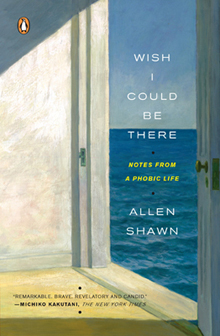The Fear Factor

Heights, spiders, bridges: a gripping account of what wracks our nerves.
"A phobia," in Allen Shawn's lyrical description, "is like a pain in the soul," and his catalog of the horrors to which we humans fall prey approaches a kind of poetry: "Some people have a fear of the sound of their own voices (phonophobia) or of seeing themselves in a mirror (eisotrophobia)… There are fears that come close to being simply a fear of being on this earth: the fear of light (photophobia), of air (aerophobia). Most circularly of all, there is the phobia of acquiring phobias." But as his dazzlingly intelligent and informative book, Wish I Could Be There (Viking), makes clear, Shawn's relation to his subject is neither purely literary nor distanced. A distinguished composer and a professor at Bennington College, Shawn has, for decades, been plagued by fears of heights, of open and enclosed spaces, of travel, bridges, elevators, tunnels, of flying, and of "any form of isolation." Part personal history, part scientific and philosophical inquiry, Wish I Could Be There explores the neuroscientific basis of terror and revulsion, considers the complex and mysterious origins of panic attacks, quotes experts ranging from Darwin to Freud to Oliver Sacks, and cites famous phobics: Blaise Pascal, Emily Dickinson, Hans Christian Andersen. The book is at its best—its most tender and incisive—when Shawn writes of the "cheerful pressure cooker" of his family life: his plucky, secretive mother; his retarded twin sister, Mary; his adored and gifted older brother, playwright and actor Wallace; and his father, New Yorker editor William Shawn, who succeeded in arranging his domestic routines and his professional career around his own anxieties. When Allen Shawn describes Mary—"She looked as if she were holding back something enormous, some news that was not part of a child's world"—his work becomes incandescently lovely, and readers will feel grateful that this talented author is so obviously unafraid to write elegantly, honestly, and directly from the heart.



